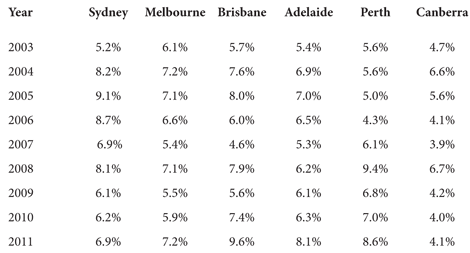Vendors must offer higher discounts to secure private treaty sales
Private treaty discounting has become necessary to secure sales across most capital cities.
Brisbane listings require the highest level of reduction, with a typical 9.6% discount needed against the original asking price, according to Australian Property Monitors.
Perth ranked second with an 8.6% discount required, according to the recently released August data.
Canberra vendors typically needed to adjust their expectations the least, with a required 4.1% price adjustment to secure a sale.
Discounting increased considerably across all capital cities in the past year, with the exception of Canberra.

Source: APM August data
Sydney’s discounting shift over the past year was second only to Canberra’s with the required discounting increasing from 6.2% in August 2010 to 6.9% in August this year.
But Sydney’s 6.9% August figure was the highest for any month this year for the city.
Melbourne’s 7.2% figure was the highest August discount required since 2004.
Buyer and seller expectations are still disconnected, Australian Property Monitors senior economist Andrew Wilson noted just before the spring selling season got underway.
He noted that days on market, discount rates and stock on market numbers were all higher than at the same time last year in the Sydney and Melbourne markets.
But Enzo Raimondo, chief executive of the Real Estate Institute of Victoria, recently noted there had been an increase in the use of the term “discounting” to describe property markets.
He says the term only describes the difference between the estimate price and not necessarily the real value.
“Unfortunately, it is a term that fundamentally misunderstands the notion of value and price in residential real estate,” Raimondo says.
“It must be remembered that in most cases that a price on a real estate advertisement is under Victorian law an estimation.
“The estimate is often based on recent comparable sales and the real estate agent’s judgment,” he says.
“It is not necessarily the price the vendor will sell for, as that often fluctuates over the course of a sales campaign.”
